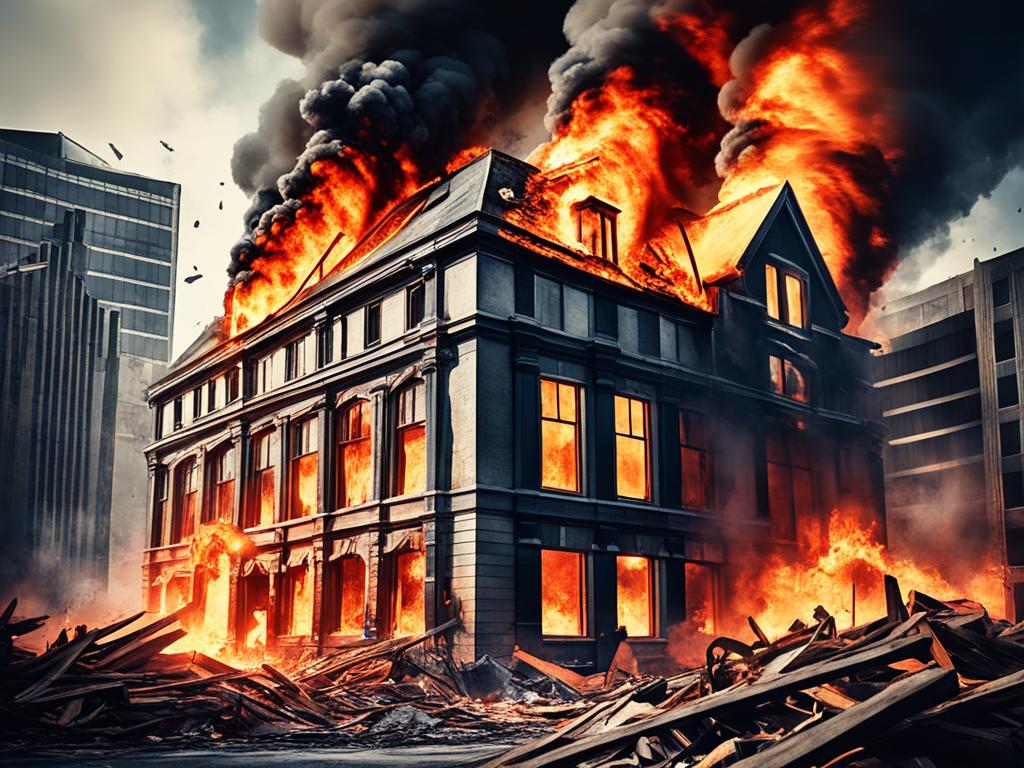Have you ever thought about why someone might set a fire on purpose? Arson attacks are a big deal that affect many people, from communities to businesses and even individuals. This article will look into the reasons behind these harmful actions and how we can stop them.
Arson means setting a fire on purpose and is usually a serious crime. It can happen to buildings, vehicles, or even nature like forests. The effects of arson are huge, causing financial loss, emotional pain, and sometimes even death.
The Devastating Impact of Arson
Arson attacks cause more than just financial harm. They leave victims with deep emotional scars and a feeling of insecurity. Losing your home or business to arson is a huge blow.
Imagine losing items you can’t replace and having to move or change your business location. This can cause a lot of stress and anxiety. Victims often feel shocked, scared, and violated after an arson attack.
Emotional Toll and Sense of Insecurity
Arson’s effects can last long after the damage is fixed. Victims might feel unsafe at home or work, always worried about another attack. The feeling of safety and stability is gone, making people and communities feel weak and helpless.
- Feelings of stress, anxiety, and fear after an arson incident
- Loss of irreplaceable personal possessions and sentimental items
- Disruption to daily life and the difficulty of finding temporary accommodation
- Ongoing concerns about the potential for future arson attacks
Remember, the emotional effects of arson aren’t your fault. You’re the victim, and the attacker is fully to blame for the harm they’ve caused. Getting help from mental health experts, victim support groups, and your community is key after an arson attack.
“Arson is a terrible crime that can have long-lasting effects on victims. The emotional trauma and sense of insecurity it leaves behind are just as devastating as the physical damage.”
Arson Attack: A Criminal Act
Arson is the act of setting someone else’s home on fire on purpose. It’s a serious crime. It has four key parts: the intent to harm, the act of burning, the burning of a home, and the home belonging to someone else. Arson can be intentional or accidental and is a felony in most places.
Arson is dangerous because it can cause death and destroy property. If someone dies in a fire started by arson, the arsonist could face charges of manslaughter or murder. Arsonists often use flammable liquids to make fires spread faster. This makes arson a serious crime, often punished as a felony.
Many arson cases are done to get insurance money. For example, Operation Firebird showed how arsonists worked together to commit fraud, stealing millions.
“Arson attacks are classified as Schedule 19 offences under the Sentencing Code, requiring a life sentence in specific cases.”
The law treats arson very seriously. Sentences depend on the value of the property, its use, and when it was set on fire. Adults over 18 face these rules, no matter when the crime was committed. Judges look at how guilty the person is and the damage done. They can give jail time or community service.
Arson is a dangerous crime that harms people and property and can be a way to commit fraud. The law has strict rules to stop and punish arsonists.
Types and Degrees of Arson
Arson is a serious crime with different levels of severity. Laws often categorize arson based on property value, intended use, and time of day. This helps determine the seriousness of the crime.
First-degree arson is one of the most severe types. It means setting fire to a building where people are usually found, like a school. This crime can lead to long jail times because it poses a high risk of harm to others.
Second-degree arson is less dangerous but still serious. It happens when a building is empty, often for insurance fraud. Even though it’s less risky, it still has serious legal consequences.
Third-degree arson involves setting fire to buildings not meant for living, like garages or empty lots. It’s less severe than the first two types but can still lead to fines and jail time.
Some places have even more specific arson charges, like fourth-degree or fifth-degree. These depend on the property’s value and the criminal intent behind the act.
Arson is a serious crime with big consequences. Knowing about its different types and penalties helps keep communities safe. It also ensures the right legal action is taken against arsonists.
“Arson is generally defined as ‘the malicious burning of the dwelling of another.'”
Insurance Fraud: A Common Motive
Arson is a devastating crime, often done for insurance fraud. People set their own property on fire, claiming it was an accident to get insurance money. This arson as insurance fraud hurts victims and the whole community a lot.
Desperation and financial trouble push people to commit fraud. Those facing job loss, falling home values, or other money issues might see arson as a way out. For example, a pizza shop owner set a fire to get insurance money because their business was failing.
The arson motive isn’t just for homes. Businesses, like food service ones, might set fires to boost their insurance claims and ease financial stress.
Insurance companies and police take arson very seriously. It causes damage and can lead to deaths. They investigate fires closely, looking at the scene and checking claims. This helps catch and stop arson insurance fraud. By tackling the causes and punishing those who do it, we can lessen this harmful crime.

“Arson is a deliberate act of setting a property on fire, representing one form of house-fire insurance fraud.”
The Perpetrators: Arsonists and Their Motives
Arsonists, often called serial arsonists for multiple fires, set fires using accelerants like gasoline. They don’t all have pyromania, an urge to set fires without control. It’s key to know this as not all arson is the same.
Arsonists have many reasons, not just for insurance fraud. Some want revenge, others seek excitement, and some have an ideology. Knowing why they do it helps us stop and deal with arson better.
Profiles of Arsonists and Pyromania
Pyromaniacs are a small part of arsonists but stand out. They’re drawn to fire’s thrill and set fires often, without thinking of the harm. This behavior is different from others who set fires for various reasons.
Most arsonists aren’t pyromaniacs. They have their own reasons, like money or revenge. Some even set fires to hide other crimes. Knowing this helps us fight arson better.
| Arsonist Profiles | Arsonist Motives |
|---|---|
| Pyromaniacs Non-pyromaniacs Serial arsonists | Insurance fraud Revenge Excitement Ideology Cover up other crimes |
Understanding arsonists’ profiles and reasons helps us fight these crimes better. It lets us make strategies that work.
Arson Attack: A Coordinated Sabotage
Recent arson attacks in France showed how arson can be a strategic move. In 2022, arsonists hit the French high-speed rail network. They damaged signal boxes and electricity installations at many places.
This action stopped the train system and affected hundreds of thousands of passengers. Those going to the Paris Olympics were among them.
The attackers knew the rail network well. They aimed at key parts to cause the most harm. The police are still looking into who did it and why. But the way the attacks were planned shows a big effort to hurt the rail system.
The effects were huge. The French rail company SNCF said their high-speed network faced a “massive attack.” This led to canceling one in four Eurostar services until Monday. The railway was expected to be down for the whole weekend, affecting thousands.
To deal with this, over 50,000 police and military were put on patrol during the Olympics. Also, 1,000 maintenance workers, 40 railway police teams, and 50 drones were used to watch and protect the rail network.
“One in four Eurostar trains will be cancelled today and over the weekend following ‘coordinated acts of malice in France.'”
The rail network arson showed the attackers knew the infrastructure well. It was a well-thought-out plan. The French Prime Minister said the saboteurs had deep knowledge of the train system. This was a clear plan to disrupt it.
The coordinated arson attacks on the French rail network have made people worried. They show how critical infrastructure can be at risk from such complex sabotage. The authorities are working hard to make the system safer and stop such events in the future.

Investigating and Prosecuting Arson Crimes
Fire Forensics and Evidence Collection
Figuring out if a fire was set on purpose is key in an arson investigation. Experts in fire forensics are crucial. They look at burn patterns, char depth, and arson evidence left behind to spot arson.
Fire forensics focus on finding and identifying substances that can ignite easily. Arsonists often use things like gasoline or kerosene to start fires. These substances leave clues that experts can find through tests.
Collecting evidence, talking to witnesses, and looking at financial records is vital for a strong case against arsonists. If arson causes harm or death, the charges can be even more serious. This shows how important a detailed investigation is.
| Arson Offense | Penalty |
|---|---|
| Arson under the Criminal Damage Act 1971 | Maximum of 10 years imprisonment |
| Arson resulting in injury or death | Potential for more severe charges like manslaughter or murder |
The Criminal Damage Act 1971 (CDA 1971) made arson a crime and changed the old law. Arson cases can be tried in court and can lead to up to 10 years in jail, as stated in the CDA 1971.
“Deliberate fires account for around 45% of all the fires attended by fire and rescue services in England, and in Wales, deliberate primary fires accounted for approximately 25% of all primary fires in 2020/21.”
Since many fires are set on purpose, fighting arson investigation and prosecution is crucial. By using fire forensics and collecting arson evidence, authorities can catch arsonists. This helps lessen the harm caused by arson attacks.
Conclusion
Arson is a crime that causes huge emotional, financial, and safety problems. It’s important to know why and how arson happens to stop it. We need to protect our homes, businesses, and important places from arson with better security, fire safety, and investigations.
We can fight against arson by spreading awareness and acting early. By using smart strategies to prevent arson, we can make our future safer for everyone. This way, we can all be safer and more secure.
Arson is a serious crime that threatens our safety. By staying alert, taking steps to protect ourselves, and supporting the police, we can help keep our community safe. Let’s work together to lessen these crimes and keep everyone safe and well.



